Kalle Vähäsöyrinki
Agrologist — Vitikon Tila, Tupos
”I was quite young when I realised that my goal was to become a full-time farmer.”
What is your farmer story?
My parents Helena and Pentti bought a small farm from Liminka, central Finland, in 1974. Back then, I was one year old. The farm was completely dilapidated, but my father took the bull by the horns. He comes from a family of settlers from Nivala, Finland. Father worked for others and, during his free time, he cleared new fields. More land was bought, and the business grew. I grew up at a farm and with a farm. I was quite young when I realised that my goal was to become a full-time farmer. A lot has been and will be done in order to achieve this goal.


How does 65 Oats differentiate itself from others and what does it take to be a contract farmer?
The mill is a family business, not a listed company. Its nearby location; it is a local actor, who commits to purchase and I commit to sell. We believe that in this equation, everybody wins. Ensuring the purity of oats is, naturally, one part of the deal.
”Barley comes into ear before oats do. And this can be seen by the naked eye.”
What does it mean to be a gluten-free oat farmer and how does it differentiate from being a regular farmer?
The cultivated seeds must be pure. Barley comes into ear before oats do. And this can be seen by the naked eye. It makes removing barley from oats easier. Twice a summer, all fields are walked through. This is how we ensure the purity of oats. Only oats can be threshed/dried at external partners’ facilities.
Why oats?
There are good oat soils in Tupos, Liminka. The soil type suits oats, and oats are a reliable plant to cultivate up here.
The future of oats?
I believe that it will be bright. Demand is increasing. The proportion of oats in food use is growing and their price increasing.


Closing words
By specializing, farmers are able to turn farming into profitable business. Currently, there are plenty of good fields in reserve in Finland due to rainy years and bad profitability. If farmers get paid the right price for the product, it will encourage them.
